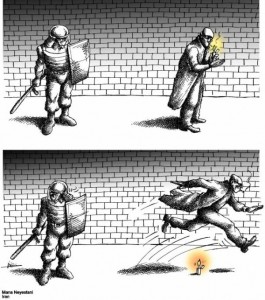The Latest from Iran (27 March): Rumours
 Saturday, March 27, 2010 at 23:56
Saturday, March 27, 2010 at 23:56  2330 GMT: A Quick Note. We've taken the evening off to spend time with friends and unwind. We'll be back bright and early on Sunday.
2330 GMT: A Quick Note. We've taken the evening off to spend time with friends and unwind. We'll be back bright and early on Sunday.Meanwhile, here's a new analysis for you: "Israel, Iran, and 'Existential Threat'".
1800 GMT: Public Funeral for Montazeri's Wife Blocked? Iranian officials have objected to a funeral procession for the wife of Grand Ayatollah Montazeri, who passed away today (see 1125 GMT), from the family house to the shrine of Masoumeh (the sister of Imam Reza, the eighth Imam of Shia) in Qom.
Ahmad Montazeri, the son of the Ayatollah, told BBC Persian that the officials limited the funeral ceremony to 150 metres from the burial site . The family objected, so the compromise is that the public can gather in the Masoumeh shrine where Grand Ayatollah Shobeyri-Zanjani will say the prayer.
The Latest from Iran (26 March): Break Time
1730 GMT: Temporarily Freed, Politically Active. Mostafa Tajzadeh, senior member of the Islamic Iran Participation Front and former Deputy Minister of Interior, continues to use his temporary release from prison to visit families of detainees and others who have been bailed but face long prison sentences. The last meeting is with key reformist thinker Saeed Hajarian, who was jailed for more than three months and put on trial after the June election.
1515 GMT: Academics and Political Prisoners. Students have sent an open letter to the head of Iran's judiciary, Sadegh Larijani, to protest the arrest of Abdollah Yousefzadegan, a law student at Allameh Tabatabai University and winner of the nationwide Olympiad of Literature. Yousefzadegan was detained on 15 March in Mashhad and has not yet been charged.
The letter condemns the harsh treatment of the academic elite and maintains that the arrest of Yousefzadegan “destroys the credibility of the judiciary and trust in the security institutions of the Islamic Republic".
1310 GMT: Rumour Denied. Mir Hossein Mousavi's website Kalemeh is denying the report, first circulated by Farda News, that Mousavi met Hashemi Rafsanjani on the first day of Nowruz.
1125 GMT: Rah-e-Sabz reports that the wife of Grand Ayatollah Montazeri passed away in Qom this morning. Her funeral will take place tomorrow 10:00 am local time.
Montazeri, the one-time successor to Ayatollah Khomeini, died in December.
1100 GMT: Nowruz Visits. Mir Hossein Mousavi and Zahra Rahnavard saw the family of Amir Aboutalebi, a Mousavi advisor who has been detained since January. Despite the efforts of Aboutalebi's family, he was not granted temporary release for Iranian New Year. Aboutalebi recently had his first phone call with his family after 45 days of detention.
A group of pro-Green Movement students of Elm-o-Sana’at University, where Aboutalebi's children study, also sent their sympathy to the family. Aboutalebi was a political prisoner of the Shah, losing an eye during his detention and was also pursued by the Mojahedin-e-Khalq (MKO) after the Revolution.
0950 GMT: Reformist Challenge. Rasoul Montakhab-nia, the deputy head of the Etemade Melli party, has declared that the Government "cannot speak with language of force to people." Montakhab-nia say that this new year should be a year of forgiveness(for protesters, and that responsible political figures should try to involve all Iranians in the "nezam" (system) and Revolution of the Islamic Republic.
0940 GMT: Subsidy Fightback. The President's supporters are hitting back at Parliament's criticism of his economic manoeuvres (see 0755 GMT). Former Minister of Health Alireza Marandi says that the duty of the Majlis is to support the Government, while Lotfollah Forouzandeh asks the Parliament to take the burden off the Government's shoulders and accept the subsidy cuts and spending proposals.
0935 GMT: Friday Prayer Round-Up. Rah-e-Sabz has the highlights of prayer addresses throughout the country. An EA correspondent gives the top prize to Hojatoleslam Kazem Sedighi in Tehran with "the keys God offered to the Supreme Leader" to solve Iran's problems. Runner-up is Ali Hajizadeh from Tabriz, who has discovered a "Velvet Revolution" in Iraq.
0925 GMT: Rumour of Day (2). The Iranian blog Che Mishavad (What Happens) blog claims that the Revolutionary Guard is laundering money, including revenues from drug smuggling, in Bahrain and Kuwait. The money is then placed through Ali Jannati, the son of Ayatollah Ahmad Jannati, the head of the Guardian Council, into a Swiss bank.
0915 GMT: Rumour of Day. Rah-e-Sabz claims that the Supreme Leader promised Hashemi Rafsanjani that most political prisoners would be freed. However, when the head of Iran's judiciary, Sadegh Larijani, tried to do so, the move was blocked by the "hard-line" Judge Abolqasem Salavati.
0755 GMT: The Subsidy Battle. Khabar Online keeps up the pressure on the President, featuring the claim of member of Parliament Hasan Qafouri Fard that Ahmadinejad is not authorised to call for a national referendum on his subsidy reduction and spending plans.
The Parliament approved an extra $20 billion in the Iranian budget from the subsidy cuts but has refused Ahmadinejad's $40 billion request.
0740 GMT: The relative quiet in Iran continues, as global attention focuses on the elections next door in Iraq. Press TV's top domestic headline is "Iran wins 3rd Sitting Volleyball World Championships".
There is a bit of a show for the first International Nowruz Celebrations in Tehran and Shiraz, as President Ahmadinejad tries to boost the image of international legitimacy. Iraqi President Jalal Talabani, Tajikistan's President Emomali Rahmon, and Turkmenistan's President Gurbanguly Berdimuhamedov are in Tehran for the two-day event, and Iranian state media reports that they will be joined by Afghan President Hamid Karzai and Turkey's Deputy Prime Minister Cemil Cicek.
A useful story from the Carnegie Council, which gets behind all the sanctions huffing-and-puffing to identify the key development, "U.S. Pressures Oil Companies to Leave Iran". This passage deserves attention and repetition:
Since the start of 2010, oil giant Royal Dutch Shell stated it would no longer sell gasoline to Iran, along with Glencore (Switzerland), Vitol (Switzerland), and Trafigura (Amsterdam). British Petroleum and Reliance (India) stopped selling to Iran in 2009. With this series of departures, Iran now imports its oil from only five sources: Total (France), Lukoil (Russia), Petronas (Malaysia), Independent Oil Group (Kuwait), and Chinese companies. [Lukoil declared just this week that it, too, would divest.]
 Abdollah Yousefzadegan,
Abdollah Yousefzadegan,  Abolqasem Salavati,
Abolqasem Salavati,  Ahmad Jannati,
Ahmad Jannati,  Ahmad Montazeri,
Ahmad Montazeri,  Ali Hajizadeh,
Ali Hajizadeh,  Ali Jannati,
Ali Jannati,  Alireza Marandi,
Alireza Marandi,  Amir Aboutalebi,
Amir Aboutalebi,  Ayatollah Ali Khamenei,
Ayatollah Ali Khamenei,  Ayatollah Hossein-Ali Montazeri,
Ayatollah Hossein-Ali Montazeri,  Ayatollah Ruhollah Khomeini,
Ayatollah Ruhollah Khomeini,  Ayatollah Shobeyri-Zanjani,
Ayatollah Shobeyri-Zanjani,  British Petroleum,
British Petroleum,  Carnegie Council,
Carnegie Council,  Cemil Cicek,
Cemil Cicek,  Che Mishavad,
Che Mishavad,  Elm-o-Sanat University,
Elm-o-Sanat University,  Emomali Rahmon,
Emomali Rahmon,  Etemade Melli,
Etemade Melli,  Glencore,
Glencore,  Gurbanguly Berdimuhamedov,
Gurbanguly Berdimuhamedov,  Hamid Karzai,
Hamid Karzai,  Hasan Qafouri Fard,
Hasan Qafouri Fard,  Hashemi Rafsanjani,
Hashemi Rafsanjani,  Hojatoleslam Kazem Seddiqi,
Hojatoleslam Kazem Seddiqi,  Imam Hossein,
Imam Hossein,  Independent Oil Group of Kuwait,
Independent Oil Group of Kuwait,  Iran,
Iran,  Iran Elections 2009,
Iran Elections 2009,  Islamic Iran Participation Front,
Islamic Iran Participation Front,  Islamic Revolution Guards Corps,
Islamic Revolution Guards Corps,  Jalal Talabani,
Jalal Talabani,  Kalemeh,
Kalemeh,  Khabar Online,
Khabar Online,  LUKoil,
LUKoil,  Lotfollah Forouzandeh,
Lotfollah Forouzandeh,  Mahmoud Ahmadinejad,
Mahmoud Ahmadinejad,  Masoumeh,
Masoumeh,  Mir Hossein Mousavi,
Mir Hossein Mousavi,  Mohammad Sadegh Larijani,
Mohammad Sadegh Larijani,  Mostafa Tajzadeh,
Mostafa Tajzadeh,  Nowruz,
Nowruz,  Petronas,
Petronas,  Rasoul Montakhab-na,
Rasoul Montakhab-na,  Reliance,
Reliance,  Royal Dutch Shell,
Royal Dutch Shell,  Saeed Hajjarian,
Saeed Hajjarian,  Sitting Volleyball,
Sitting Volleyball,  Total,
Total,  Trafigura,
Trafigura,  Vitol,
Vitol,  Zahra Rahnavard,
Zahra Rahnavard,  sanctions in
sanctions in  Middle East & Iran
Middle East & Iran 




